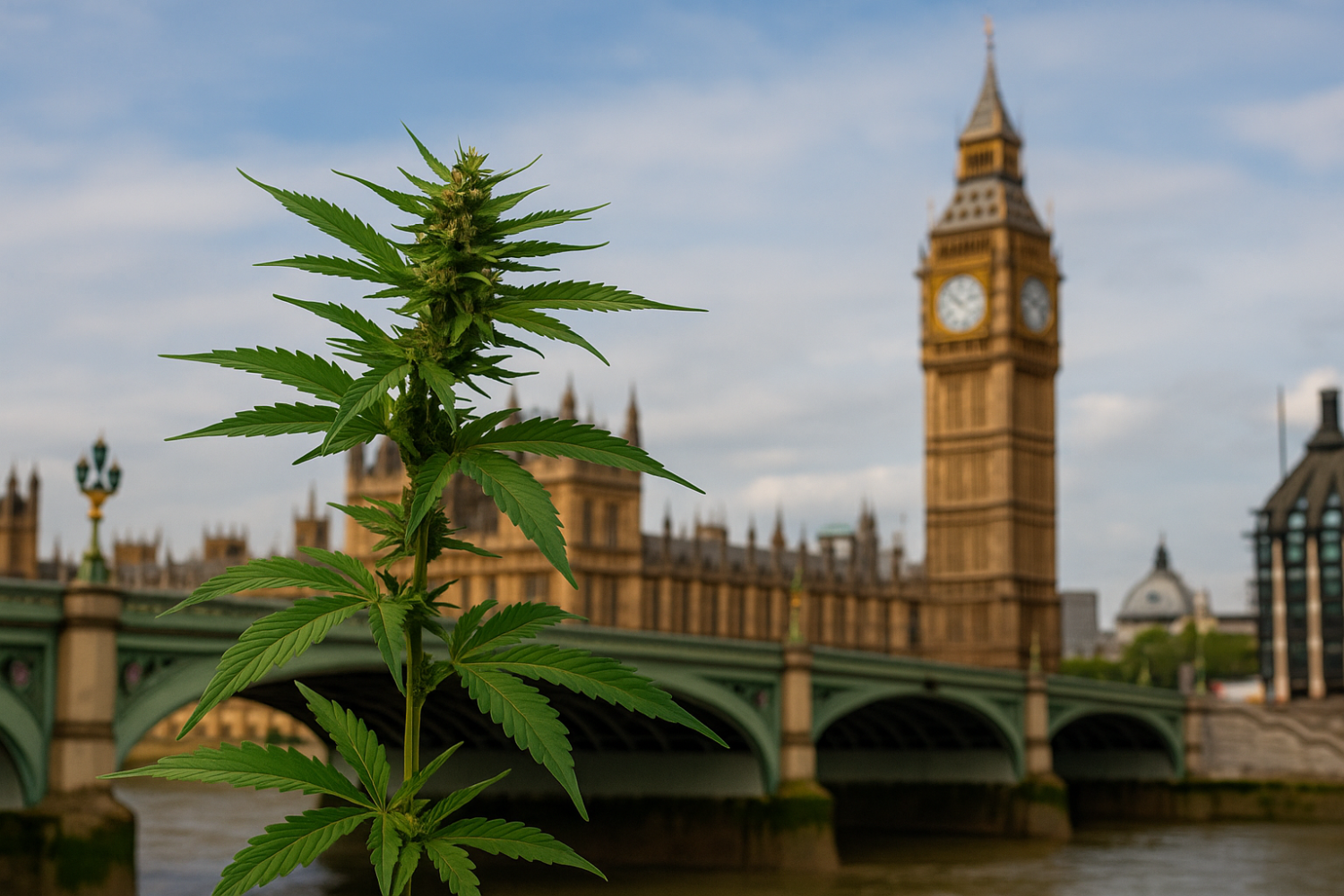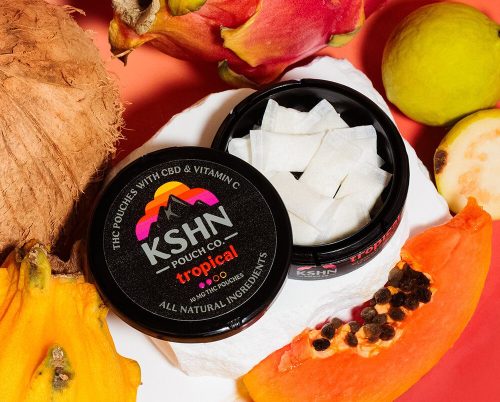For decades, cannabis in the United Kingdom has existed in a grey area of British life, culturally familiar yet legally restricted. While most of the world seems to be shifting toward reform, the United Kingdom remains hesitant, balancing outdated laws with growing medical and economic realities.
Cannabis remains classified as a Class B drug under the Misuse of Drugs Act 1971, yet thousands of British patients now legally receive cannabis-based medicines for chronic conditions. The tension between prohibition and progress defines the national conversation.
As the cannabis economy expands globally, the UK’s cautious approach is being tested by shifting science, patient advocacy, and new political pressure. From the 2018 legalization of medical cannabis to renewed decriminalization debates in London, policymakers are being forced to confront the mismatch between public opinion and current law.
Below, we explore the legal, medical, and social landscape shaping cannabis in Britain today, and what the next decade could bring.
The Legal Landscape of Cannabis in the United Kingdom
The UK’s foundation for cannabis regulation remains the Misuse of Drugs Act 1971, which categorizes cannabis as a Class B substance, the same tier as amphetamines. Possession can result in up to five years in prison, while supply or production carries penalties of up to 14 years and an unlimited fine. Although some police forces have adopted discretion-based enforcement or “diversion schemes,” national law remains strict.
Cannabis was briefly downgraded to Class C between 2004 and 2009, a move intended to focus police resources on harder drugs. Public backlash, however, led to its re-elevation to Class B. Despite that reversal, enforcement patterns have softened: many first-time offenders now receive warnings or fines rather than custodial sentences. Still, critics argue the UK’s policy is inconsistent and outdated, citing how arrest and conviction rates disproportionately impact young Black men and low-income communities, a dynamic noted in reports by the London Drugs Commission and the Home Office.
Medical Cannabis in the United Kingdom: Legal on Paper, Limited in Practice
In November 2018, the UK made history by allowing cannabis-based products for medicinal use in humans (known as CBPMs) to be prescribed by specialist doctors. This shift followed high-profile cases like that of young epilepsy patient Alfie Dingley, whose successful treatment with cannabis oil abroad ignited national debate. Yet despite legal reform, access remains narrow. Only two products, Sativex (nabiximols) for multiple sclerosis and Epidyolex for rare forms of epilepsy — have full MHRA approval and NHS coverage.
Other cannabis medicines can be prescribed privately under “special” access routes, but few NHS clinicians are willing or able to prescribe them due to cost, bureaucracy, and limited clinical guidance from NICE (the National Institute for Health and Care Excellence). According to a House of Commons Library report, roughly 5,000 NHS prescriptions for cannabis-based medicines were issued in 2023, a fraction of the total need, with thousands more patients turning to private clinics or the illicit market.
The result is a two-tiered system: those who can afford private treatment gain legal access, while others risk criminal penalties for sourcing their medicine. A 2024 Guardian investigation called the UK’s medical cannabis rollout “a quiet revolution shackled by red tape,” underscoring how patients with chronic pain, PTSD, and cancer-related symptoms remain under-served despite overwhelming evidence of potential benefit.
Recreational Cannabis in the United Kingdom: Criminalised Yet Common
While politicians debate reform, cannabis remains Britain’s most widely used illegal substance. Surveys suggest roughly one-third of UK adults have tried cannabis, and around 7–8% report current use. Despite prohibition, cannabis culture thrives, from London house parties to rural music festivals, creating a persistent disconnect between law and lived reality.
Studies from King’s College London and other institutions have linked frequent high-THC use to increased psychosis risk, especially among younger users, prompting renewed calls for harm-reduction-based education rather than criminalization.
Critics argue that prohibition has done little to curb use but has succeeded in fueling stigma and social inequity. Former Metropolitan Police Commissioner Cressida Dick herself acknowledged in 2022 that cannabis enforcement “diverts limited police resources from serious crime.”
Several police jurisdictions, including Durham, Thames Valley, and parts of London, have quietly shifted toward diversion programs, steering users toward education or treatment rather than arrest. Still, national drug strategy under the Home Office maintains that legalization “would send the wrong message,” even as decriminalization momentum builds elsewhere in Europe.
Political Momentum: London Leads the Debate for Cannabis in the United Kingdom
Reform efforts have largely been driven at the city level. In 2025, Mayor Sadiq Khan’s London Drugs Commission, chaired by Lord Falconer, formally recommended removing natural cannabis from the Misuse of Drugs Act and regulating it under the Psychoactive Substances Act instead, a shift that would effectively decriminalize possession and move toward a public-health model. The report argued that criminalization “causes more harm than the drug itself,” citing racial disparities in enforcement and lost economic opportunity.
Though the Home Office immediately rejected the idea, public sentiment is clearly shifting. A 2025 YouGov poll found that 73% of Britons believe doctors should be able to prescribe cannabis freely, and over 60% support some form of regulated adult use. Even several Members of Parliament across party lines, including Labour, Liberal Democrats, and some Conservatives — have voiced interest in reform. Still, with a national election on the horizon, few leaders are willing to campaign on full legalization.
CBD and Hemp: Britain’s Quiet Cannabinoid Economy
While high-THC cannabis remains tightly controlled, CBD (cannabidiol) has become Britain’s unofficial gateway to the cannabis conversation. CBD oils, gummies, and beverages are now sold in mainstream retailers like Boots and Holland & Barrett, though regulations are still in flux. The Food Standards Agency (FSA) has begun approving select CBD products as novel foods, with the first official authorisations expected by spring 2025.
Hemp cultivation is legal under licence, provided THC content stays below 0.2%. Yet farmers face barriers to using the flower, often the most valuable part of the plant, because current Home Office licences only permit use of seeds and stalks. Advocacy groups argue that aligning hemp laws with EU and North American standards could boost rural economies and sustainable agriculture. Analysts from Prohibition Partners estimate that the UK’s combined CBD and medical-cannabis market could exceed £2 billion by 2027 if regulatory reform continues.
The Medical Market and Industry Players
Despite limited NHS access, a private medical-cannabis sector has rapidly emerged. Clinics such as Sapphire Medical, Zerenia, and Releaf UK now offer online consultations with specialist doctors who can legally prescribe cannabis flower, oils, and capsules imported from licensed producers in Canada, Germany, and Portugal. Patients typically pay between £150 and £300 per month, depending on dosage.
Meanwhile, UK-based companies like Glass Pharms are pioneering domestic cultivation using carbon-neutral greenhouses to reduce reliance on imports. These facilities are licensed by the Home Office and inspected by the Medicines and Healthcare products Regulatory Agency (MHRA), setting a standard for pharmaceutical-grade cannabis production in Europe.
Industry advocates say establishing a domestic supply chain could make prescriptions more affordable and ensure product consistency. Yet without NHS adoption, market growth depends almost entirely on private consumers and international exports, a paradox where Britain produces cannabis it rarely prescribes to its own citizens.
The Justice and Public-Health Paradox
Beyond economics, the cannabis in the United Kingdom dilemma is deeply moral. Criminalization continues to affect roughly 100,000 people annually, mostly for possession. Convictions can carry lifelong consequences for employment, travel, and housing. In 2024, Release UK, the country’s leading drug-policy NGO, published data showing that Black Britons are 11 times more likely to be stopped and searched for drugs than white citizens, even though overall usage rates are comparable. The findings reignited national discussion about racial bias and the cost of outdated drug enforcement.
At the same time, public-health experts warn that unregulated high-THC products flooding the illicit market pose real risks, including synthetic adulterants and inconsistent potency. Many reform advocates argue that regulation, not prohibition, would better control product safety, tax revenue, and youth access. The success of regulated markets in Germany, Canada, and several U.S. states has not gone unnoticed in Parliament.
Cultural Reality: From Music to Medicine
Cannabis in the United Kingdom has long been intertwined with British culture, from reggae’s influence on London’s sound system scene to its ubiquity in hip-hop, festival, and nightlife communities. Today, cannabis-related conversation extends beyond stoner stereotypes.
Mainstream media regularly cover patient access stories, investment forecasts, and scientific studies. Universities such as King’s College London and University College London (UCL) are conducting world-class cannabinoid research on chronic pain, mental health, and neurodegenerative diseases.
Meanwhile, wellness brands market CBD teas and balms to middle-class consumers, while artists, athletes, and entrepreneurs push for destigmatization. The plant once dismissed as countercultural has become an everyday topic of policy debate, innovation, and lifestyle.
Future Scenarios: What Comes Next for Cannabis in the United Kingdom
Looking forward, three main outcomes seem plausible:
1. Incremental Reform – The most likely path involves steady expansion of medical access, more NHS funding for approved indications, and decriminalization pilots in major cities. The government may follow the London Drugs Commission’s recommendation to move cannabis from the Misuse of Drugs Act into a regulated framework within this decade.
2. Full Legalization – If European neighbours like Germany and Switzerland demonstrate successful regulatory outcomes, the UK could adopt an adult-use model by 2030. Economic modelling by Prohibition Partners suggests legalization could generate £3 billion annually in tax revenue and 40,000 jobs.
3. Conservative Retrenchment – Alternatively, a future government could double down on criminalization, citing youth health concerns and political optics. This outcome seems less likely given generational shifts, polls show over 70% of Britons aged 18-34 support legalization — but remains possible if reform is politicized.
Britain at a Crossroads for Cannabis in the United Kingdom
Cannabis in the United Kingdom stands on the edge of change. Six years after legalizing medical cannabis, its framework remains cautious, expensive, and exclusionary. Yet the pressure is mounting — from patients demanding relief, doctors seeking clarity, businesses pursuing opportunity, and citizens tired of outdated policies.
The debate is no longer about whether cannabis belongs in Britain’s future, but how it will be integrated: as a tightly controlled medicine, a taxed consumer product, or a regulated wellness commodity. The outcome will define not just a market, but a mindset, one that measures compassion, evidence, and justice in equal parts.
As the rest of the world moves forward, Britain must decide whether to remain a reluctant participant or a thoughtful leader in the next era of cannabis policy. Either way, the conversation has already begun and it’s growing louder by the day.
–
Pair your next smoke session with a Triple hemp THC seltzer or lemonade or a Happie hemp THC seltzer — use code RespectMyRegion20 at checkout for a discount on Happie products. Both deliver smooth, uplifting effects that enhance relaxation and complement your favorite terpenes.
Affiliate Disclaimer:
Some links in this article may be affiliate links. Respect My Region may earn a small commission if you purchase through them. The code “RespectMyRegion20” provides a discount on Happie products. All products are intended for adults 21+ and compliant with hemp and cannabis laws where applicable. Respect My Region does not sell or distribute THC or hemp-derived products directly.







